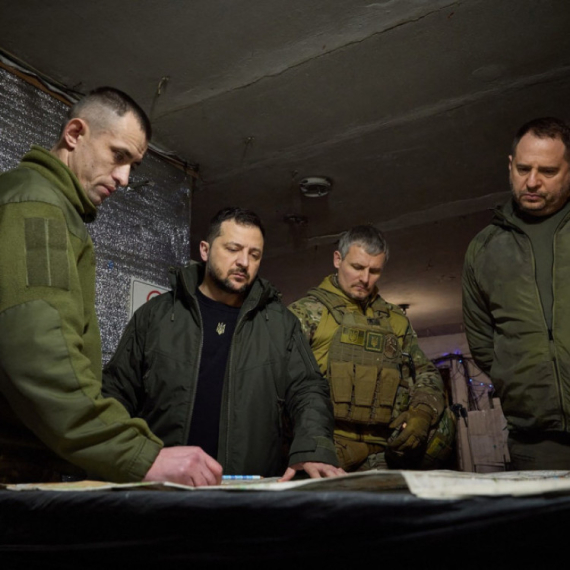Vanity Fair meets Ramush Haradinaj
U.S. Vanity Fair magazine brings a ten-page article on Ramush Haradinaj in its December issue.
Saturday, 22.11.2008.
15:17

U.S. Vanity Fair magazine brings a ten-page article on Ramush Haradinaj in its December issue. Haradinaj, and ethnic Kosovo Albanian was one of the leaders of the so-called Kosovo Liberation Army, KLA, and after the 1999, a Kosovo prime minister. Vanity Fair meets Ramush Haradinaj The Hague Tribunal indicted him for war crimes that included kidnapping, rape, torture and murder, but he was acquitted of all charges. Now Vanity Fair says that Haradinaj, who "killed a lot of people", is "the Balkan Rambo", and says he is, "perhaps more than anyone else", responsible for "provoking Serbia into the campaign of ethnic cleansing which led to the NATO intervention of 1999". The article, entitled, "House of War", starts with a quote from "the laws of the Kanun of Leke Dukagjin", which among other things instructs its followers in matters such as blood feuds and revenge over "damaged honor". It is on that basis, William Langewiesche writes, that the Haradinaj conducted his fight against "Milosevic's authority" in Kosovo. The former KLA warlord is, according to Vanity Fair, speaking fluent English and is "disarmingly open" in conversation. "His mouth hangs open, but no one should doubt that Haradinaj is smart," the article assures. Haradinaj confided in the magazine's reporter that he was a nightclub bouncer in Switzerland and France in the early 1990s, but that even then, he was thoroughly preparing for war in Kosovo. "Upon his return to the Balkans, around 1995, he began systematically to run guns across the mountains from Albania into Kosovo." "After the war started in earnest, he earned the name Rambo for his stubbornness in battle against the Serbs. Picture a blood-drenched fighter holding his ground with a machine gun in each hand. He was wounded many times. He killed a lot of people," Vanity Fair writes. The article's author then ventures to conclude that the Serbs "would kill him if they could. They would shoot him in the head and throw his body into a ditch. They would wrap him in barbed wire and drag him to death behind a car. This is what they say he did to their people." As for Kosovo nowadays, Haradinaj is quoted as saying that fifty percent of the population is unemployed. "Fifty percent unemployment? More like fifty percent black marketeering, smuggling, and tax evasion. But there was perhaps no contradiction in Haradinaj’s mind," Langewiesche writes. Despite a large inflow of money from foreign funds to Kosovo, it is still a place where the mechanisms of government do not function, a place controlled by a system that is characterized by ties and arrangements made outside the law, Vanity Fair writes. Its reporter also noted Haradinaj's Pristina house, "a large, round-roofed structure that stands on a hill facetiously known as Mount Olympus, can be seen from much of the city, where its opulence speaks to the spoils of war".
Vanity Fair meets Ramush Haradinaj
The Hague Tribunal indicted him for war crimes that included kidnapping, rape, torture and murder, but he was acquitted of all charges.Now Vanity Fair says that Haradinaj, who "killed a lot of people", is "the Balkan Rambo", and says he is, "perhaps more than anyone else", responsible for "provoking Serbia into the campaign of ethnic cleansing which led to the NATO intervention of 1999".
The article, entitled, "House of War", starts with a quote from "the laws of the Kanun of Leke Dukagjin", which among other things instructs its followers in matters such as blood feuds and revenge over "damaged honor".
It is on that basis, William Langewiesche writes, that the Haradinaj conducted his fight against "Milošević's authority" in Kosovo.
The former KLA warlord is, according to Vanity Fair, speaking fluent English and is "disarmingly open" in conversation.
"His mouth hangs open, but no one should doubt that Haradinaj is smart," the article assures.
Haradinaj confided in the magazine's reporter that he was a nightclub bouncer in Switzerland and France in the early 1990s, but that even then, he was thoroughly preparing for war in Kosovo.
"Upon his return to the Balkans, around 1995, he began systematically to run guns across the mountains from Albania into Kosovo."
"After the war started in earnest, he earned the name Rambo for his stubbornness in battle against the Serbs. Picture a blood-drenched fighter holding his ground with a machine gun in each hand. He was wounded many times. He killed a lot of people," Vanity Fair writes.
The article's author then ventures to conclude that the Serbs "would kill him if they could. They would shoot him in the head and throw his body into a ditch. They would wrap him in barbed wire and drag him to death behind a car. This is what they say he did to their people."
As for Kosovo nowadays, Haradinaj is quoted as saying that fifty percent of the population is unemployed.
"Fifty percent unemployment? More like fifty percent black marketeering, smuggling, and tax evasion. But there was perhaps no contradiction in Haradinaj’s mind," Langewiesche writes.
Despite a large inflow of money from foreign funds to Kosovo, it is still a place where the mechanisms of government do not function, a place controlled by a system that is characterized by ties and arrangements made outside the law, Vanity Fair writes.
Its reporter also noted Haradinaj's Priština house, "a large, round-roofed structure that stands on a hill facetiously known as Mount Olympus, can be seen from much of the city, where its opulence speaks to the spoils of war".














































Komentari 38
Pogledaj komentare